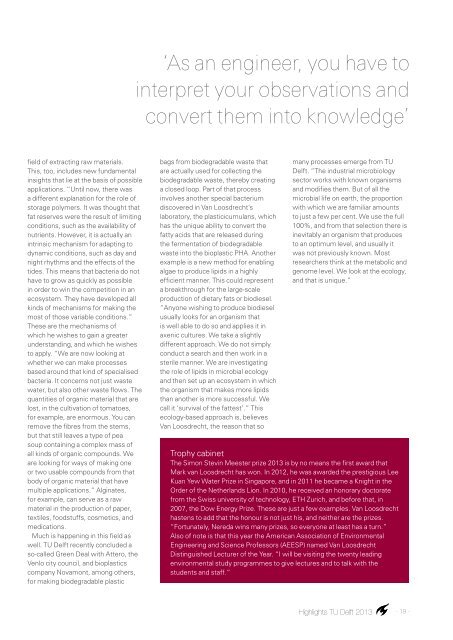Mark-van-Loosdrecht-EN
Mark-van-Loosdrecht-EN
Mark-van-Loosdrecht-EN
You also want an ePaper? Increase the reach of your titles
YUMPU automatically turns print PDFs into web optimized ePapers that Google loves.
‘As an engineer, you have to<br />
interpret your observations and<br />
convert them into knowledge’<br />
field of extracting raw materials.<br />
This, too, includes new fundamental<br />
insights that lie at the basis of possible<br />
applications. “Until now, there was<br />
a different explanation for the role of<br />
storage polymers. It was thought that<br />
fat reserves were the result of limiting<br />
conditions, such as the availability of<br />
nutrients. However, it is actually an<br />
intrinsic mechanism for adapting to<br />
dynamic conditions, such as day and<br />
night rhythms and the effects of the<br />
tides. This means that bacteria do not<br />
have to grow as quickly as possible<br />
in order to win the competition in an<br />
ecosystem. They have developed all<br />
kinds of mechanisms for making the<br />
most of those variable conditions.”<br />
These are the mechanisms of<br />
which he wishes to gain a greater<br />
understanding, and which he wishes<br />
to apply. “We are now looking at<br />
whether we can make processes<br />
based around that kind of specialised<br />
bacteria. It concerns not just waste<br />
water, but also other waste flows. The<br />
quantities of organic material that are<br />
lost, in the cultivation of tomatoes,<br />
for example, are enormous. You can<br />
remove the fibres from the stems,<br />
but that still leaves a type of pea<br />
soup containing a complex mass of<br />
all kinds of organic compounds. We<br />
are looking for ways of making one<br />
or two usable compounds from that<br />
body of organic material that have<br />
multiple applications.” Alginates,<br />
for example, can serve as a raw<br />
material in the production of paper,<br />
textiles, foodstuffs, cosmetics, and<br />
medications.<br />
Much is happening in this field as<br />
well. TU Delft recently concluded a<br />
so-called Green Deal with Attero, the<br />
Venlo city council, and bioplastics<br />
company Novamont, among others,<br />
for making biodegradable plastic<br />
bags from biodegradable waste that<br />
are actually used for collecting the<br />
biodegradable waste, thereby creating<br />
a closed loop. Part of that process<br />
involves another special bacterium<br />
discovered in Van <strong>Loosdrecht</strong>’s<br />
laboratory, the plasticicumulans, which<br />
has the unique ability to convert the<br />
fatty acids that are released during<br />
the fermentation of biodegradable<br />
waste into the bioplastic PHA. Another<br />
example is a new method for enabling<br />
algae to produce lipids in a highly<br />
efficient manner. This could represent<br />
a breakthrough for the large-scale<br />
production of dietary fats or biodiesel.<br />
“Anyone wishing to produce biodiesel<br />
usually looks for an organism that<br />
is well able to do so and applies it in<br />
axenic cultures. We take a slightly<br />
different approach. We do not simply<br />
conduct a search and then work in a<br />
sterile manner. We are investigating<br />
the role of lipids in microbial ecology<br />
and then set up an ecosystem in which<br />
the organism that makes more lipids<br />
than another is more successful. We<br />
call it ‘survival of the fattest’.” This<br />
ecology-based approach is, believes<br />
Van <strong>Loosdrecht</strong>, the reason that so<br />
many processes emerge from TU<br />
Delft. “The industrial microbiology<br />
sector works with known organisms<br />
and modifies them. But of all the<br />
microbial life on earth, the proportion<br />
with which we are familiar amounts<br />
to just a few per cent. We use the full<br />
100%, and from that selection there is<br />
inevitably an organism that produces<br />
to an optimum level, and usually it<br />
was not previously known. Most<br />
researchers think at the metabolic and<br />
genome level. We look at the ecology,<br />
and that is unique.”<br />
Trophy cabinet<br />
The Simon Stevin Meester prize 2013 is by no means the first award that<br />
<strong>Mark</strong> <strong>van</strong> <strong>Loosdrecht</strong> has won. In 2012, he was awarded the prestigious Lee<br />
Kuan Yew Water Prize in Singapore, and in 2011 he became a Knight in the<br />
Order of the Netherlands Lion. In 2010, he received an honorary doctorate<br />
from the Swiss university of technology, ETH Zurich, and before that, in<br />
2007, the Dow Energy Prize. These are just a few examples. Van <strong>Loosdrecht</strong><br />
hastens to add that the honour is not just his, and neither are the prizes.<br />
“Fortunately, Nereda wins many prizes, so everyone at least has a turn.”<br />
Also of note is that this year the American Association of Environmental<br />
Engineering and Science Professors (AEESP) named Van <strong>Loosdrecht</strong><br />
Distinguished Lecturer of the Year. “I will be visiting the twenty leading<br />
environmental study programmes to give lectures and to talk with the<br />
students and staff.”<br />
Highlights TU Delft 2013<br />
- 19 -


